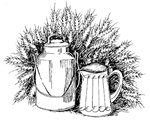A HEALTHY COLON: THE KEY TO WELLBEING
 It has been said that death begins in the colon. The colon (large intestine) is where the wastes from the foods we eat are stored and then eliminated in the stool. This elimination should be a daily occurrence and ideally several times per day. For many people this simply is not the case.
It has been said that death begins in the colon. The colon (large intestine) is where the wastes from the foods we eat are stored and then eliminated in the stool. This elimination should be a daily occurrence and ideally several times per day. For many people this simply is not the case.
Nearly everyone living in modern societies is constipated. There are two types of constipation. One type is where the stool is packed together resulting in it being difficult to have a bowel movement. A second and most common type of constipation is where hardened waste material accumulates on the walls of the colon and narrows the passageway for waste to pass. This kind of constipation is not often recognized as one can have reasonably normal bowel function and still have this type of constipation. It is this type of constipation that often leads to problems of the colon such as hemorrhoids, diverticulosis, diverticulitis, colitis, spastic colon, irritable bowel syndrome (IBS), Cohn’s disease and colon cancer. Anyone who has eaten refined and processed food for any length of time has this kind of constipation.
The key to preventing colon problems is to increase transit time. Transit time is the time it takes from the moment you eat a meal to the time you eliminate the wastes from the digestion of that meal. The shorter the transit time, the less chance there is of waste material accumulating and sticking to the walls of the colon. The key to shorting transit time is to get enough fiber into the daily diet. Fiber is the non-digestible portion of the foods that we eat. Fiber is often removed when food is processed and refined.
A number of years ago, British surgeon Dr. Dennis Burkitt demonstrated the relationship between transit time and fiber intake. In studying the dietary habits of native Africans, he found their intake of dietary fiber was around 40 to 50 grams per day. He found their transit time to be around 30 to 35 hours. At the same time, he found that for many in his own country who were eating the typical low fiber Western diet, the transit time was up to 72 hours. These Africans had virtually none of the colon problems referenced above. It’s been found that people who eat a diet of mainly processed and refined foods get only 10 to 15 grams of fiber per day. Colon problems have become epidemic where the diet is low in fiber.
What is the solution?
It is important to get at least 30 to 40 grams of fiber into the diet on a daily basis. To get this much fiber requires a diet plentiful in fruits, vegetables, nuts and seeds, whole grain products and legumes. If you find it difficult to eat such a diet, you can supplement the diet by adding fiber products such as wheat and oat bran, psyllium husks and ground up flax seed. Such fibers can be added to various foods or eaten by themselves.
Your diet should contain a combination of soluble and insoluble fiber. Soluble fiber dissolves in water and forms a gel as it passes through the intestinal tract. It picks up both current waste material and wastes that may have accumulated along the walls of the colon due to lack of consistent elimination. Insoluble fiber does not absorb water and basically acts as roughage to promote the movement of waste material through the colon and into the stool.
Many commonly used plant sources of fiber contain both soluble and insoluble fibers. Psyllium husks contain a mixture of 70% soluble and 30% insoluble fibers. Oat bran is around 50% soluble and 50% insoluble fibers. Wheat bran is around 90% insoluble fiber. Flax seed is a good source of fiber and provides insoluble fiber about two to one over soluble fiber.
An important point to remember when increasing the fiber content of the diet is to also increase the amount of water that you drink. Water is a critical component of the entire waste removal process, and fiber demands water for it to properly facilitate waste elimination. Try to drink purified water!
Even after increasing the fiber content of the diet, you may still experience a sluggish bowel reflex resulting in poor and irregular eliminations. Standard over the counter laxatives are habit forming and tend to irritate the bowel into action. Herbs, such as cascara sagrada and senna leaf, can be used to stimulate the flow of bile from the gall bladder which in turn will create the urge to have a bowel movement. These herbs should not be used routinely as they also can become habit forming. There are a variety of colon cleansing formulas available. One such product we carry at Milk ‘N Honey is called Herbal Fiber Blend. This product has proven to be very effective in facilitating good bowel function and cleansing of the colon of impacted waste material. At Milk ‘N Honey we also carry psyllium, oat, wheat and flax fiber products.
Getting sufficient fiber in the diet on a daily basis can go a long way toward preventing colon disease and facilitating better all around health. Daily eliminating the wastes of metabolism is essential to a healthy body. Begin today to increase your daily fiber intake.